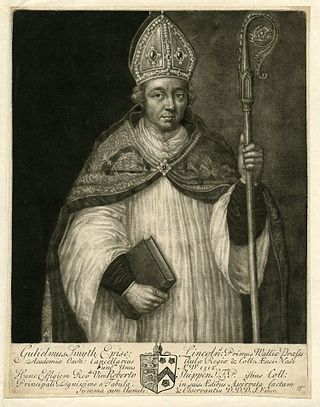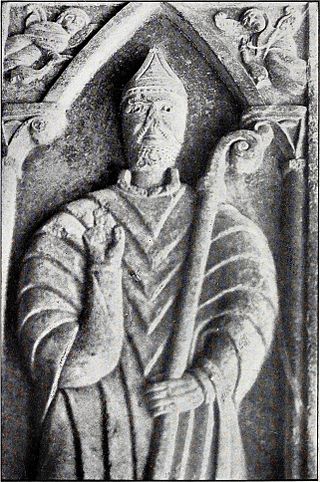Related Research Articles
William de Corbeil or William of Corbeil was a medieval Archbishop of Canterbury. Very little is known of William's early life or his family, except that he was born at Corbeil, south of Paris, and that he had two brothers. Educated as a theologian, he taught briefly before serving the bishops of Durham and London as a clerk and subsequently becoming an Augustinian canon. William was elected to the See of Canterbury as a compromise candidate in 1123, the first canon to become an English archbishop. He succeeded Ralph d'Escures who had employed him as a chaplain.
Thomas Langton was chaplain to King Edward IV, before becoming successively Bishop of St David's, Bishop of Salisbury, Bishop of Winchester, and Archbishop-elect of Canterbury.

Thomas Burgess was an English author, philosopher, Bishop of St Davids and Bishop of Salisbury, who was greatly influential in the development of the Church in Wales. He founded St David's College, Lampeter, was a founding member of the Odiham Agricultural Society, helped establish the Royal Veterinary College in London, and was the first president of the Royal Society of Literature.

William de Longchamp was a medieval Lord Chancellor, Chief Justiciar, and Bishop of Ely in England. Born to a humble family in Normandy, he owed his advancement to royal favour. Although contemporary writers accused Longchamp's father of being the son of a peasant, he held land as a knight. Longchamp first served Henry II's illegitimate son Geoffrey, but quickly transferred to the service of Richard I, Henry's heir. When Richard became king in 1189, Longchamp paid £3,000 for the office of Chancellor, and was soon named to the see, or bishopric, of Ely and appointed legate by the pope.

William Smyth was Bishop of Coventry and Lichfield from 1493 to 1496 and then Bishop of Lincoln until his death. He held political offices, the most important being Lord President of the Council of Wales and the Marches. He became very wealthy and was a benefactor of a number of institutions. He was a co-founder of Brasenose College, Oxford and endowed a grammar school in the village of his birth in Lancashire.

Peter Mews was an English Royalist theologian and bishop. He was a captain captured at Naseby and he later had discussions in Scotland for the Royalist cause. Later made a bishop he would report on non-conformist families.

Robert Reid was Abbot of Kinloss, Commendator-prior of Beauly, and Bishop of Orkney. He was born at Aikenhead in Clackmannan parish, the son of John Reid and Elizabeth Schanwell. His formal education began in 1511 at St Salvator's College in St Andrews University under the supervision of his uncle, Robert Schanwell, dean of the faculty of arts. Reid graduated in 1515 and by 1524 was subdean at Elgin Cathedral where, by 1527, he was Official of Moray. Thomas Chrystall, the abbot of Kinloss, chose Reid as his successor in 1526. In 1527, as abbot-designate, he attended the court of Pope Clement VII on abbacy business. While returning via Paris in 1528, Reid met the Piedmontese humanist scholar Giovanni Ferrerio who accompanied him back to Scotland. Following Chrystall's resignation in July 1528, Reid was blessed as abbot in September and received the Priory of Beauly, in commendam, in 1531. In that same year, Ferrerio left the court of James V to join Reid at Kinloss as tutor to the monks of both Kinloss and Beauly. Reid held many offices of state between 1532 and 1542 including ambassadorial roles to England and France and as a senior law official. He considerably improved the external and internal fabric of both monasteries in 1538.

Thomas Bek, Beck, or Becke was a Bishop of St David's in Wales.

Bartholomew of Exeter was a medieval Bishop of Exeter. He came from Normandy and after being a clerk of the Archbishop of Canterbury, was made Archdeacon of Exeter in 1155. He became Bishop of Exeter in 1161. Known for his knowledge of canon law, he was involved in the Becket controversy after the appointment of Thomas Becket as Archbishop of Canterbury. After Becket's death, although he was frequently at the royal court, he mainly attended to his diocese. A number of works by him survive, including sermons and treatises on law and theology.

Rev. John Lloyd DCL (1533-1607) was a Welsh lawyer, Judge of the High Court of Admiralty in London, board member of All Souls College, and a cofounder, along with Queen Elizabeth Tudor, of the first Protestant College at the University of Oxford.
Dr Richard Gwent was a senior ecclesiastical jurist, pluralist cleric and administrator through the period of the Dissolution of the Monasteries under Henry VIII. Of south Welsh origins, as a Doctor of both laws in the University of Oxford he rose swiftly to become Dean of the Arches and Archdeacon of London and of Brecon, and later of Huntingdon. He became an important figure in the operations of Thomas Cromwell, was a witness to Thomas Cranmer's private protestation on becoming Archbishop of Canterbury, and was Cranmer's Commissary and legal draftsman. He was an advocate on behalf of Katherine of Aragon in the proceedings against her, and helped to deliver the decree of annulment against Anne of Cleves.
Benedict Nichols, also spelt Nicholls, was a priest and bishop of the Roman Catholic Church, successively a parish priest in England, a canon of Salisbury Cathedral, and Bishop of Bangor and Bishop of St David's in Wales.
James Allan Smith was the fifth Dean of St Davids.
John Fuller was the master of Jesus College, Cambridge. As bishop's chancellor in Ely, Cambridgeshire, he was charged with suppressing Christian heresy, condemning several heretics to be burnt at the stake.
Henry White LLD was an English priest, academic, and lawyer. He was Vice-Chancellor of the University of Oxford in 1531, and principal of the School of Canon Law.
Thomas Rodborne DD was an English medieval churchman and university chancellor.
Nigel de Wavere DD was an English medieval theologian, churchman, college fellow, and university chancellor.
Henry de Maunsfeld DD was an English medieval theologian, philosopher, churchman, college fellow, and university chancellor.
Henry de Stanton was an English medieval Canon law jurist, judge, churchman, and university chancellor.
William Fleshmonger(? -1541/42), the son of a Winchester College tenant, was born in Hambledon, Hampshire. He was a Doctor of Canon Law and Dean of Chichester during the turmoil of the English Reformation.
References
- ↑ Catto, J. I., ed. (1984). "Canon law before 1380". The History of the University of Oxford. Vol. I: The Early Oxford Schools. Oxford University Press. p. 541. ISBN 9780199510115.
- ↑ Hibbert, Christopher, ed. (1988). "Appendix 5: Chancellors of the University". The Encyclopaedia of Oxford . Macmillan. pp. 521–522. ISBN 0-333-39917-X.
- ↑ Wood, Anthony (1790). "Fasti Oxonienses". The History and Antiquities of the Colleges and Halls in the University of Oxford. pp. 19–20 – via Internet Archive.